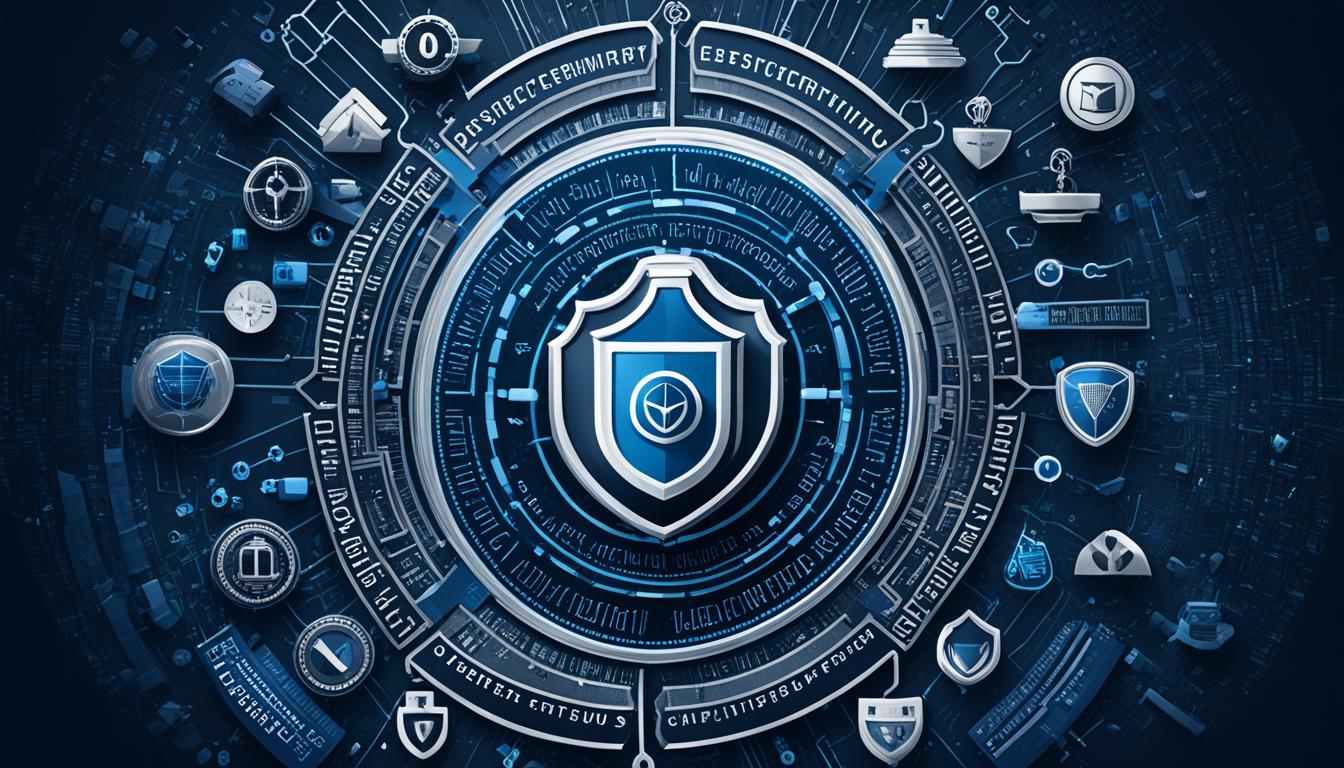With nearly 600,000 open cybersecurity jobs in the United States, the demand for skilled cyber security professionals is at an all-time high. If you have a passion for math, technology, and combating cybercrime, pursuing a bachelor’s degree in cybersecurity can be the ideal starting point for a successful career in this field.
While there are multiple paths to a career in cybersecurity, a bachelor’s degree is often required for management, leadership, and advanced technical roles. The top bachelor’s degrees in cyber security provide a comprehensive education in both business knowledge and technical skills, ensuring that graduates are well-equipped to tackle the challenges of the industry.
Key Takeaways:
- Obtaining a bachelor’s degree in cybersecurity is essential for management, leadership, and advanced technical roles in the field.
- There are nearly 600,000 open cybersecurity jobs in the United States, highlighting the high demand for skilled professionals.
- The top bachelor’s degrees in cybersecurity offer a combination of business knowledge and technical skills.
- These programs prepare graduates for careers as vulnerability assessors, security specialists, source code auditors, and more.
- A bachelor’s degree in cybersecurity provides a solid foundation for professional advancement and continuous learning in this rapidly growing industry.
What Is Cybersecurity?
Cybersecurity is the practice of protecting systems and networks from digital attacks. It originated in the 1970s with the invention of email and the development of the first computer worm. Today, there are over one million Americans employed in the cybersecurity field, with a significant number of job openings still available. Cybersecurity professionals work in both public and private sectors, safeguarding valuable financial, healthcare, and national security data. As the field continues to grow, the requirements for cybersecurity education are dynamic, with entry-level positions often accessible through bootcamps or community college programs, while more advanced roles usually require a bachelor’s degree or higher.
The cybersecurity field is crucial in the digital age where organizations face constant threats from cybercriminals seeking to compromise sensitive information. The rapid advancement of technology has paved the way for innovative digital attacks that target individuals, businesses, and even governments. Cybersecurity professionals play a vital role in defending against these threats and ensuring the confidentiality, integrity, and availability of data and systems.
Protecting Against Digital Attacks
Cybersecurity professionals utilize a range of techniques and strategies to protect systems and networks from digital attacks. These include:
- Implementing firewalls, antivirus software, and intrusion detection systems to prevent unauthorized access
- Regularly updating software and patching vulnerabilities to address security weaknesses
- Conducting vulnerability assessments and penetration testing to identify and remediate potential vulnerabilities
- Implementing secure coding practices to develop robust and resilient software applications
- Establishing strong password policies and multi-factor authentication to enhance authentication security
- Monitoring network traffic and employing threat intelligence to detect and respond to emerging threats
By implementing these measures, cybersecurity professionals help organizations mitigate the risks posed by cyber threats and ensure the continuity of operations. They are constantly evolving their defenses to stay one step ahead of cybercriminals and protect against new and emerging threats.
The Importance of Cybersecurity Education
“The field of cybersecurity is complex and ever-changing. To excel in this field, professionals need a solid foundation of knowledge and skills acquired through cybersecurity education.” – Jessica Adams, Cybersecurity Expert
Cybersecurity education is essential to equip individuals with the necessary skills and knowledge to enter and succeed in the cybersecurity field. While entry-level positions can sometimes be obtained through bootcamps or community college programs, a bachelor’s degree or higher is typically required for more advanced roles. Cybersecurity education provides a comprehensive understanding of the concepts, principles, and technologies used in cybersecurity, preparing individuals for the challenges they will face in their careers.
| Benefits of Cybersecurity Education | Obtaining a Bachelor’s Degree or Higher in Cybersecurity: |
|---|---|
| Ensures a deep understanding of cybersecurity concepts and methodologies | Provides a broad range of technical skills, including programming, network security, and incident response |
| Enhances problem-solving and critical thinking abilities | Equips individuals with leadership and management skills necessary for higher-level roles |
| Exposes students to real-world scenarios through hands-on projects and internships | Offers networking opportunities with industry professionals and organizations |
| Increases employability and opens doors to a wide range of cybersecurity career paths | Provides access to broader cybersecurity community and professional organizations |
By investing in cybersecurity education, individuals can position themselves for long-term success in the cybersecurity field and contribute to the protection of valuable assets and information against digital threats.
Job Requirements for Cybersecurity Experts
When it comes to cybersecurity, experts in the field have similar day-to-day activities and require specific skills to excel in their roles. Effective communication, attention to detail, and problem-solving abilities are essential for all cybersecurity specialists. These professionals must be able to communicate complex technical concepts in a clear and concise manner to both technical and non-technical stakeholders. Strong written and verbal communication skills are crucial for collaborating with team members, explaining security measures to clients, and presenting findings to management.
Cybersecurity experts also need to have a solid understanding of computer fundamentals, which include knowledge of operating systems, networks, and hardware. They should be able to analyze and interpret system logs, identify vulnerabilities, and implement appropriate security measures to safeguard networks and information systems.
Proficiency in programming languages is another key requirement for cybersecurity specialists. Skills in languages such as Python, Java, C++, or SQL are highly valuable in areas such as threat analysis, vulnerability assessment, and incident response. Programming abilities enable experts to create and maintain security tools, as well as to automate manual processes.
Risk assessment protocols play a vital role in the work of cybersecurity experts. These professionals need to be able to understand and evaluate potential risks and damages to information systems. They must be adept at conducting risk assessments, identifying vulnerabilities, and implementing mitigation strategies to ensure the security of organizational assets.
In addition to these foundational skills, specialized roles within the cybersecurity field may require additional expertise. For example, penetration testers require advanced knowledge of ethical hacking techniques, while professionals specializing in cyberlaw need to possess extensive knowledge of legal frameworks, regulations, and policies related to cybersecurity.
Ultimately, cybersecurity professionals need to stay up to date with the latest techniques and technologies used by cybercriminals. They must continuously educate themselves and participate in regular training programs to ensure they have the knowledge and skills necessary to protect systems and networks effectively.
Job Requirements Summary:
- Effective communication skills to convey complex technical concepts and collaborate with team members
- Strong understanding of computer fundamentals, including operating systems, networks, and hardware
- Proficiency in programming languages such as Python, Java, C++, or SQL
- Ability to conduct risk assessments and implement mitigation strategies
- Specialized knowledge in areas like ethical hacking, cyberlaw, or power systems protection, depending on the role
- Ongoing education and staying up to date with the latest cybersecurity techniques and technologies

“The cybersecurity field is constantly evolving, and professionals need to continuously update their skills and knowledge to meet emerging threats and challenges.”
As the cybersecurity landscape continues to evolve, the job requirements for cybersecurity experts will adapt accordingly. By keeping up with advancements in technology and staying abreast of industry trends, cybersecurity specialists can effectively protect systems and networks from cyber threats.
Commonly Required Skills for Cybersecurity
Cybersecurity professionals rely on a range of skills to solve problems and protect against cyber threats. Strong problem-solving abilities, including diagnostic testing, modeling, data analysis, and creativity, are crucial for effectively addressing new and emerging issues. Computer forensics techniques allow cybersecurity specialists to uncover and present hidden information used by cybercriminals. Proficiency in programming languages such as Python, JavaScript, PHP, SQL, and C is essential for countering hacking attempts. Additionally, cybersecurity experts must be skilled in risk assessment, scoping, identifying, and analyzing potential threats to determine adequate protection measures.
Problem-Solving Skills
One of the most important skills for cybersecurity professionals is problem-solving. As cyber threats evolve and become more complex, professionals with strong problem-solving abilities are better equipped to mitigate risks and develop effective solutions. By utilizing diagnostic testing, modeling, data analysis, and exercising creativity, cybersecurity experts can efficiently address new and emerging issues.
Computer Forensics Techniques
Cybersecurity specialists employ computer forensics techniques to investigate and gather evidence about cybercriminal activities. By analyzing digital artifacts and network logs, they can uncover crucial information that helps identify the perpetrators and further prevent similar attacks in the future. Computer forensics enables professionals to reconstruct cybercrime incidents and present evidence in legal proceedings.
Programming Languages
Proficiency in programming languages is essential for cybersecurity professionals tasked with countering hacking attempts. The ability to code in languages such as Python, JavaScript, PHP, SQL, and C allows experts to develop secure applications, analyze vulnerabilities, and create robust defenses against cyber threats. Knowledge of programming languages enhances their ability to monitor and protect networks, systems, and critical data from unauthorized access and exploitation.
Risk Assessment
Risk assessment is a fundamental skill for cybersecurity professionals as it involves scoping, identifying, and analyzing potential threats and vulnerabilities. By assessing risks, experts can determine adequate protection measures to mitigate the impact of cyber attacks. Understanding the risk landscape enables cybersecurity professionals to implement proactive strategies and protocols to safeguard systems and networks from potential security breaches.

| Skill | Description |
|---|---|
| Problem-Solving | Ability to address new and emerging issues through diagnostic testing, modeling, data analysis, and creativity. |
| Computer Forensics | Utilizing techniques to investigate cybercriminal activities, gather evidence, and reconstruct cybercrime incidents. |
| Programming Languages | Proficiency in languages such as Python, JavaScript, PHP, SQL, and C to develop secure applications and defend against cyber threats. |
| Risk Assessment | Scoping, identifying, and analyzing potential threats and vulnerabilities to determine adequate protection measures. |
Frequently Desired Skills for Cybersecurity
In addition to the commonly required skills, there are several skills that are frequently desired in the cybersecurity field. These skills are crucial for addressing the evolving nature of cyber threats and ensuring effective protection for sensitive data and critical infrastructure.
Data Security
One of the most important skills in cybersecurity is a deep understanding of data security laws and regulations. Compliance with these laws is essential for organizations to protect sensitive information and maintain the trust of their customers. Cybersecurity professionals with expertise in data security can help organizations ensure compliance and implement effective risk assessment and management practices.
Cyber Counterintelligence
Defending against state-sponsored cyber attacks and cyber espionage requires specialized skills in cyber counterintelligence. Cybersecurity professionals with expertise in counterintelligence can identify and neutralize the tactics used by sophisticated threat actors and protect vital national security and economic interests.
Cyber-Physical Infrastructure
Securing cyber-physical infrastructures, such as those used in the medical, manufacturing, and avionics industries, is crucial for preventing disruptions and ensuring public safety. Cybersecurity professionals with knowledge of best practices for securing these complex systems can help organizations identify vulnerabilities and implement robust security measures.
Grid Protection
The protection of power grids from cyber attacks is a critical concern for both national security and public safety. Cybersecurity professionals with expertise in grid protection can design and deploy advanced security solutions to safeguard these essential infrastructure networks.
Cybersecurity Policy
The development and implementation of effective cybersecurity policies play a crucial role in combating cyber threats at a global level. Cybersecurity professionals with expertise in cybersecurity policy can shape the overall approach to surveillance, digital development, and internet governance, ensuring a safe and secure digital environment for individuals, organizations, and governments.
By acquiring these frequently desired skills, cybersecurity professionals can enhance their expertise and contribute significantly to the protection of sensitive data, critical infrastructure, and national security.

| Skill | Description |
|---|---|
| Data Security | Understanding of data security laws and regulations, compliance management, risk assessment and management |
| Cyber Counterintelligence | Ability to identify and counter state-sponsored cyber attacks and cyber espionage |
| Cyber-Physical Infrastructure | Expertise in securing complex cyber-physical systems used in critical industries |
| Grid Protection | Knowledge of techniques and tools for protecting power grids from cyber attacks |
| Cybersecurity Policy | Understanding of global cybersecurity policies and their impact on digital development |
Education Requirements for Cybersecurity Experts
Cybersecurity experts play a crucial role in protecting systems and networks from digital threats. To excel in this field, professionals need specialized knowledge in programming languages, penetration testing, ethical hacking, and computer operating systems.
Cybersecurity education can be obtained through various pathways, such as bootcamps, academic programs, or self-directed learning. Bootcamps provide intensive, hands-on training that focuses on practical skills and industry-relevant knowledge. Academic programs, on the other hand, offer comprehensive courses that cover both theoretical foundations and practical applications.
Both bootcamps and academic degrees can prepare individuals for industry certifications, which are often required by employers in specific roles. These certifications validate an individual’s skills and knowledge, making them more competitive in the job market.
While some entry-level positions may not require a degree, mid-level cybersecurity professionals typically need a bachelor’s degree in cybersecurity or a related field. A bachelor’s degree provides a deeper understanding of cybersecurity principles, advanced technical skills, and critical thinking abilities. It also helps individuals develop strong communication and problem-solving skills, which are essential in the field.
For those aiming for advanced technical roles or management positions, a master’s degree in cybersecurity may be required. A master’s degree offers in-depth knowledge in specialized areas such as cybersecurity policy, digital forensics, or network security.
Research and teaching careers in cybersecurity often require a doctoral degree. A doctoral degree equips individuals with the expertise needed to contribute to the field through research, innovation, and education.
As the cybersecurity field continues to evolve, professionals must stay updated with the latest technologies and best practices. Continuing education, such as attending workshops, conferences, or pursuing industry certifications, is essential for career growth and staying competitive in this ever-changing industry.

The Benefits of Cybersecurity Education
“Cybersecurity education provides individuals with the necessary skills to protect against digital threats and contributes to creating a safer digital environment.”
Investing in cybersecurity education offers numerous benefits. Firstly, it equips professionals with the knowledge and skills needed to secure systems and networks effectively. Cybersecurity education provides a deep understanding of cyber threats, vulnerabilities, and risk management strategies, enabling individuals to proactively detect and mitigate potential attacks.
Secondly, formal education in cybersecurity enhances career prospects. Employers often prioritize candidates with a solid educational background in cybersecurity when hiring for mid-level and advanced technical positions. A degree or certification in cybersecurity demonstrates an individual’s commitment to the field and proves their expertise.
Lastly, cybersecurity education fosters continuous learning and professional development. The field of cybersecurity is rapidly evolving, with new threats and technologies emerging regularly. By pursuing formal education, professionals can keep up with the latest trends, innovations, and industry best practices, ensuring they remain at the forefront of the field.
Choosing the Right Cybersecurity Education Pathway
When considering a cybersecurity education pathway, it is essential to assess individual goals, learning preferences, and career aspirations. Here are some factors to consider:
- Time commitment: Bootcamps offer intensive, immersive training over a shorter period, making them a viable option for individuals looking to enter the industry quickly. Academic programs, such as bachelor’s or master’s degrees, require a longer time commitment but provide a more comprehensive education.
- Cost: Bootcamps often have a lower upfront cost compared to academic programs. However, scholarships and financial aid options are available for both pathways.
- Credential recognition: Consider the industry’s recognition of credentials obtained through bootcamps or academic programs. Employers may have preferences or requirements for specific certifications or degrees.
- Learning style: Assess personal learning preferences and consider whether an immersive, hands-on bootcamp experience or a more structured academic program aligns better with individual learning styles.
- Career goals: Determine individual career goals and choose an education pathway that provides the necessary knowledge and skills to achieve those goals. It is also vital to consider the potential for advancement and specialization in the chosen pathway.
Ultimately, cybersecurity education is a valuable investment for individuals looking to build a successful career in a rapidly growing industry. Whether through bootcamps, academic programs, or self-directed learning, acquiring the necessary skills and knowledge is crucial to becoming a competent cybersecurity expert.
Bachelor’s Degrees in Cybersecurity
Bachelor’s degrees in cybersecurity provide a comprehensive education that equips students with the necessary business knowledge and technical skills to excel in this dynamic field. These programs typically require around 120 credits and take four years to complete. In addition to cybersecurity-specific courses, students also gain a solid foundation in liberal arts, enhancing their critical thinking and communication skills.
One of the key advantages of pursuing a bachelor’s degree in cybersecurity is the opportunity to choose from various concentrations that align with specific career goals. Some popular concentrations include:
- Offensive cybersecurity
- Cloud computing
- Game development
- Computer programming and analytics
By specializing in a particular area, students can develop expertise in their chosen field and increase their marketability in the job market.
Upon completion of a bachelor’s degree in cybersecurity, graduates have a wide range of career paths to explore. Some common job roles include:
- Vulnerability Assessor
- Security Specialist
- Source Code Auditor
- Incident Responder
- Security Consultant
These roles offer the opportunity to work in diverse industries such as finance, healthcare, government, and technology.
While a bachelor’s degree in cybersecurity opens up various career opportunities, individuals looking to pursue advanced technical roles or leadership positions may need to further their education. Additional cybersecurity education, such as a master’s degree, can provide the necessary specialized knowledge and skills for these advanced positions.
Overall, a bachelor’s degree in cybersecurity provides students with a solid foundation in both technical expertise and business acumen, opening doors to a rewarding and secure career in the field of cybersecurity.
Conclusion
Pursuing a bachelor’s degree in cybersecurity provides a solid foundation for a successful career in this rapidly growing industry. With the digital landscape constantly evolving, the demand for trained cybersecurity professionals is on the rise. By acquiring the necessary skills and knowledge through formal education, individuals can unlock numerous career opportunities in a field that offers job security, competitive salaries, and the chance to make a real difference in combating cyber threats.
As the job market continues to expand, professionals with cybersecurity education can specialize in various areas, such as offensive cybersecurity, cloud computing, game development, or computer programming and analytics. With a bachelor’s degree in cybersecurity, graduates can pursue careers as vulnerability assessors, security specialists, source code auditors, and more. Furthermore, advanced technical roles and leadership positions often require additional cybersecurity education, such as a master’s degree.
Continual learning and professional advancement are integral to success in the cybersecurity field. Whether individuals choose to start with an associate degree, advance to a bachelor’s degree, or pursue higher education with a master’s or doctoral degree, there are ample opportunities for growth and development. By staying updated on the latest industry trends and continuously enhancing their skills, cybersecurity professionals can excel in a field that not only offers exciting career prospects but also plays a crucial role in ensuring the safety and security of our digital world.




No comments! Be the first commenter?